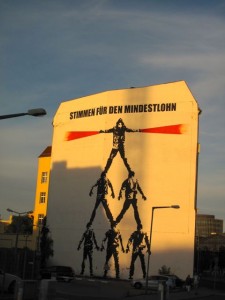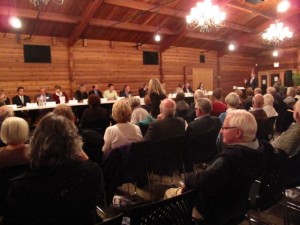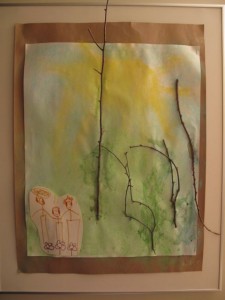Posts Tagged ‘politics’
A Question of Size
“We may not be big but we’re small!”
As CBC radio listeners know, that’s the motto of the Vinyl Café, the vinyl record store at the heart of Stuart McLean’s storytelling series.
I think the motto counterbalances another common theme of our times: “Bigger is Better”. A concept which often leads to trouble economically, politically, and environmentally.
The Vinyl Café motto is also a good fit for Lions Bay Community School, a primary school in School District 45 which enrolls approximately 60 students per year in kindergarten to Grade 3. A privately run preschool also operates on the premises.
In June, I attended the school’s leave-taking ceremony for its Grade 3s, a ceremony which marks their “graduation” and acknowledges their future status as intermediate students at other schools starting in September.
Lions Bay, it seems to me, is so big in what it does even though it is small.
Why?
Part of it is the setting. Nestled in the forest, the school seems to be swimming in an ocean of green.
Part of it is the architecture. Now over 30 years old, the school is built on an open-concept plan which allows an unparalleled flow between learning spaces and allows the teaching staff an exceptional amount of flexibility.
Part of it is the community. Families who choose to live in Lions Bay have made a specific lifestyle choice and they are active participants in the school because it is a major focus for the community.
There are challenges, too. Because it is so highly dependent on area demographics, enrollment at the school can only be maintained as long as there are young families in the area or willing longer-distance commuters (for example, if Squamish families or Horseshoe Bay residents were to choose the school for their children).
In addition to the excellent teaching staff, the supportive community, and the outstanding physical environment, size is something else that gives Lions Bay an edge. Being small helps the school fulfill its mission statement “to provide a safe learning environment and strive to enable students to become confident learners”.
The size of the school, in my opinion, keeps the student experience at the heart of operations by allowing a higher degree of personal attention. It has also sparked innovation in pedagogical approaches.
These factors have all combined to ensure success for these young students.
Being small can be effective.
Which brings me to the measures being taken to restructure the bargaining framework in BC’s public education system. Measures which I hope are not a prelude to regionalizing or eliminating Boards of Education.
As John Abbott, President of the 21st Century Learning Initiative, cautioned during a visit to West Vancouver earlier this year, losing local governance puts the future of learners at risk by distancing the local community from decision-making.
So here’s what I hope our provincial government and the leadership of BCSTA remember as they work together during the remaining days of summer.
Bigger is not always better.
Artwork by Lions Bay students on display in the gym.
Do I Want To Know?
Ignorance is bliss.
Or so they say.
And as we hurtle through the German countryside, on this train voyage from Berlin to Frankfurt, on the last leg of our summer adventure abroad, I believe it may be true.
Throughout this trip, I’ve had access to wireless connections and have checked my email regularly, followed Facebook postings and Twitter messages, but not to the same extent I do at home.
I haven’t read the newspaper each morning, I haven’t listened to broadcast news, and I haven’t been voraciously consuming the ups and downs of world events, whether trivial or significant. It helps that many of our accommodation spots have not provided access to a television or that we’ve been too busy exploring to watch.
So while I’ve been connected, I haven’t been obsessed and that’s opened room in my thoughts and daily experience to a stronger sense of well-being.
Which is an odd place to be for someone who is an advocate of digesting information regularly, of learning, of being aware that the world is so much more than our immediate circles of influence.
So if ignorance is bliss, why bother with education?
In thinking about this question, I realize how value-laden the field of education is as is the contemplation of what constitutes the qualities of our existence as social beings.
We talk about believing in better, but what’s better?
We talk about the value of knowledge, but what is knowledge?
We talk about leading good lives, but what constitutes a good life?
In addition, as I contemplate the historical record (traveling in Europe seems to make history somehow more real and pressing), I realize that crimes and atrocities, throughout the centuries and in our own day, are or have been committed by well-educated people.
Education has not acted as a barrier to tragedy, war, deprivation, suffering, inequality, and injustice.
And while I have a feeling the key is to keep asking questions rather than settling on fixed answers, there is one conclusion I feel able to draw with some certainty.
The most important result of education is to enable people to become and to be critical thinkers. And while the search for consensus may be integral to making progressive changes (what is progress? why change?), individual voices are needed now more than ever as is tolerance for different points of view.
And that’s a troubling aspect of political life in Canada and elsewhere along with the evolution of our mainstream media systems. It seems the goal is to manipulate citizens into thinking en masse by removing dissension and erasing individuality.
I can’t help feeling that we should – at this point in time and with the lessons of history – know better.
Ignorance may be bliss, but, as my nephew says (he’s recently graduated from the University of Bradford Peace Studies Department) “blissed” ignorance is not just.
Perhaps that’s the ultimate purpose of education then: to establish, maintain, and sustain just societies.
If so, let’s get on with it.
Being Human and the Loss of Perspective in Politics
Errare humanum est [To err is human]. – Anonymous: Latin
For to err in opinion, though it be not the part of wise men, is at least human. – Plutarch (46-120 C.E.)
I presume you’re mortal, and may err. – James Shirley (1596-1666)
To err is human, to forgive divine. – Alexander Pope (1688-1744)
Then gently scan your brother man,/ Still gentler sister woman;/ Though they may gang a kennin’ wrang. To step aside is human. – Robert Burns, Address to the Unco Guid [1787]
“Address to the Unco Guid’ makes the point that it is this natural sympathy and compassion that is important in society: not self-righteous condemnation.” – Juliet Linden Bicket
I remembered Alexander Pope’s words this week as I watched events unfold in the BC provincial election. When I checked my copy of Bartlett’s Familiar Quotations to verify them, the footnotes led me to other quotes on the same theme and to Google for the full text of the Burns poem where I found the comment by Bicket.
And despite these wise words, which span approximately 2,000 years of human history, it would seem that in our time the motto has become “to err is human and to forgive is impossible”.
Or maybe even more to the point, “to err is human and let’s make sure everyone’s mistakes are never forgotten”.
And given our rush to judge others on this principle, it seems to me that the greatest disincentive to running for public office has become the process of getting elected.
While this trend has been emerging over time, it seems to have bloomed with noxious fervour in this election.
We’re all on the lookout for “bozo eruptions”. That’s the term applied to the actions of candidates who slip up in real time, but everything has become fair game: whether a word that’s said today or over 20 years ago, whether a misstep now or one from long ago.
And I have to ask what added value, if any, is there in this “new” way of doing politics. Does it benefit voters? Does it allow society to progress? Does it ensure the health and vitality of our democratic institutions?
Why?
Because we have made perfection a condition of holding office and yet no one is perfect. It’s not human.
Because we have lost perspective. If anything from any point in our lives can be construed as a liability, then we lose the ability to distinguish between misdemeanors and serious crimes.
Because we have forgotten that living involves choices and that we sometimes make bad choices, particularly when we’re young. But we learn and those mistakes do not necessarily or automatically make us incapable, incompetent, or untrustworthy for life.
Because setting up impossible standards for conduct and behaviour lead to unreasonable controls being implemented to maintain power once it’s been secured.
And that’s why we have a parliament full of men and women commonly derided as trained seals.
We have parliaments and legislatures which we denigrate and political representatives whom we disrespect. We have governments, political parties, and candidates who are more focused on slander and defamation, on digging up the dirt, than they are on policy and good governance.
And that’s an unforgivable mistake.
What Does It Mean?
Stepping into a profession, we can expect to be bombarded by acronyms and terms specific to that field. The BC public education system, for example, is rife with them: MoE, BCSTA, BCPSEA, BCSSA, BCASBO, BCTF, CUPE, BCCPAC, HR, F&F, AFG, AbEd, IB, PYP, MYP, IEP, FSAs, standardized testing, needs assessment, self-regulation, special needs, 21st century learning, etc.
Amongst the list of terms is one used to describe the model in which Boards of Education and the provincial government function: co-governance.
But what does co-governance mean?
I decided to look it up and started with the word governance. Here’s what I found:
governance:
- government; exercise of authority; control.
- a method or system of government or management.
And “co-”? It’s apparently a variation of “com-” which is defined as follows:
a prefix meaning “with,” together,” “in association,” and (with intensive force) “completely,” occurring in loan words from Latin (commit): used in the formation of compound words…
Putting the two together, I can say co-governance is a shared exercise of authority, control exerted in association with one another, or a partnership system of government or management.
Defining the term is easy, but applying it to BC’s public education system, as currently structured and operating, may be a misnomer.
Why?
Because the inherent nature of the relationship is one of imbalance. Public education is financed by public revenues which are allocated by the province.
And if one party in a relationship is the ultimate arbiter of funds, then it may be a challenge to ensure that other critical issues are addressed on the basis of a co-governance model. In the past few weeks alone, we’ve seen the release of a 10-year framework for bargaining as well as the debut of a new website, mostly with little or no direct consultation with Trustees.
I’ll admit it’s not easy when one has a firm grasp of the purse strings to share control, but the current structure is paternalistic and does not lend itself easily to a co-governance model.
And while my call for a Royal Commission on Education is likely to continue falling on deaf ears, here are two things I’d like to see.
First, I would like all eligible voters in BC to vote in the May 14 provincial election no matter what their political persuasion.
Second, I would like the new government, whether Liberal, NDP, Green, Conservative, or other to convene a meeting with Board of Education Trustees. Maybe two from each district. That’s a group of 120 people.
And talk.
Have a real discussion.
A substantive discussion.
One where Trustees do most of the speaking and elected officials and Ministry representatives do the listening.
And then do the same with each significant group in the education sector.
Compile the results of these discussions, distribute the report, and then put everyone in a room together to see if we can work together to ensure that our children will continue to benefit from a vibrant and thriving public education system.
One that is not characterized, if I may borrow from the philosopher Hannah Arendt, by questions of “what are we fighting against”, but “what are we fighting for?”.
And let’s see, if through dialogue, we can put the “co-” back into “co-governance”.
A Conversation Starter Or The End of A Conversation?
Ratified. That’s the word which characterizes this weekend for me. It denotes success and a goal accomplished. It indicates progress and sets a marker for the way forward.
The Agreement in Committee, a framework for bargaining which was fashioned in a collaborative effort between BCPSEA* and the BCTF**, was ratified this weekend at two separate meetings: the BCPSEA Annual General Meeting and the BCTF Representative Assembly.
This is a bold step for these two organizations. It sets the stage for positive dialogue before the start of labour negotiations. That doesn’t necessarily mean the discussions will be easier or decisions arrived at without difficulty; it does mean that the parties have opened a door to a respectful process, respectful interaction, and — I hope — results.
Yet this step forward may have been jeopardized given the startling turn of events on Thursday, January 24, 2013.
Why?
On Thursday, the provincial government released a document entitled “A Framework For Long Term Stability In Education” ) which came as a surprise to many of us who have a role to play in the public education system in British Columbia.
Although stakeholder submissions had been made by key partner groups on the issue of bargaining before the December holidays, this framework was much broader and incorporated many more issues than I believe were contemplated in those submissions.
While the goal of “stability” in education is admirable, and the narrative that has been designed to sell this new initiative may sound awfully good, scratch beneath the surface and many troubling issues emerge.
For example, why 10 years? Where is the business case for introducing a level of inflexibility which may take away from the employers’ ability to respond to changing circumstances and uncertain economic conditions? Given rapid changes in technology and the reassessment of education, which seems to be in progress in many parts of the world, proposing such a lengthy time span seems like building your foundation on shifting sands.
Premier Clark and Don McRae, the Minister of Education, have both spoken about the plan and the media, including the full array of social media, have played and replayed, digested and parsed their comments.
I also had the opportunity of hearing Minister McRae speak in-person at the BCPSEA AGM today.
He said, again, that this framework was just the beginning, but I see it as stalling momentum rather than encouraging it.
Rather than asking what the best way to fund the public education system may be, we are now debating the merits of establishing yet another separate fund to deal with specific aspects of program delivery and service provision.
Rather than asking what the best way to set educational policy may be, we are now debating who should sit at the table of the proposed educational council.
Rather than asking how to ensure the best working relationship between the parties who negotiate, we are now trying to guess why the government seems intent on stripping BCPSEA of its core mandate which is to bargain on behalf of the 60 school boards in the province.
This government-proposed framework, says Minister McRae, is a conversation starter.
I see it, unlike the now-ratified Agreement in Committee, as a conversation ender.
*British Columbia Public Schools Employers’ Association (https://www.bcpsea.bc.ca)
**British Columbia Teachers Federation (https://www.bctf.ca)




